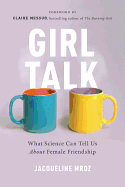
In Girl Talk, New York Times science writer Jacqueline Mroz (Scattered Seeds) delves into the background, benefits, challenges and specificity of platonic relationships between women, looking at female friendship across history, culture and age. Mroz employs reportage from scientific studies and interviews with anthropologists, psychologists and neuroscientists, as well as anecdotes from sources and her own personal stories.
She uncovers biological, evolutionary and social factors that help explain why women's friendships are different than men's. For example, female hormones enhance connections in the communications area of the brain, so women tend to be better at expressing emotion and recognizing other people's feelings. Throughout history, women often lived with their in-laws after marriage, so they'd exhibit submissiveness and vulnerability, which increased empathy in their new female relatives. And in the 18th century, the new popularity of novels shaped women's understanding of relationships and people in real life.
Mroz notes how different cultures view friendship; for example, Koreans forge deep, lifelong connections, and they are more likely to intervene in their friends' lives than Americans are. She also explores the health benefits of friendship, how technology impacts these relationships and how friend breakups can cause more grief than ending a romance.
Mroz takes on the difficult but important task of understanding the nuances of friendship through scientific study. Girl Talk takes the bonds between women seriously, and offers a compelling and necessary look at some of the most vital interactions in a woman's life. --Katy Hershberger, freelance writer and bookseller

